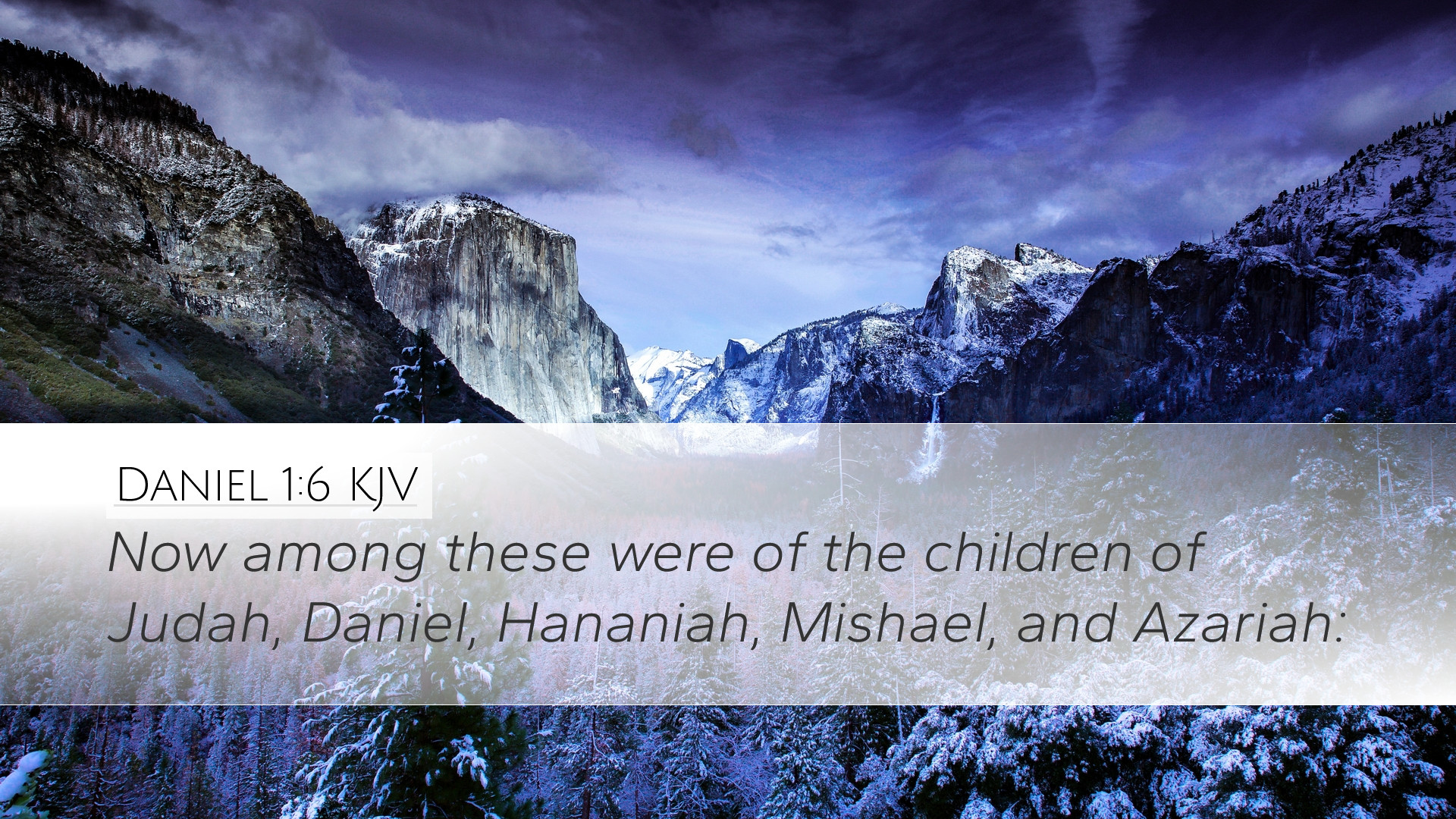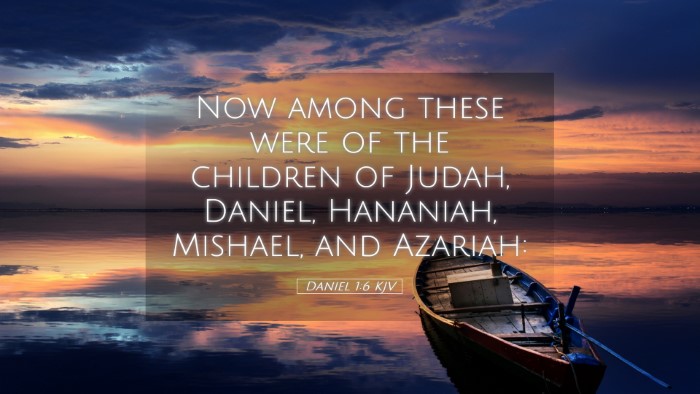Old Testament
Genesis Exodus Leviticus Numbers Deuteronomy Joshua Judges Ruth 1 Samuel 2 Samuel 1 Kings 2 Kings 1 Chronicles 2 Chronicles Ezra Nehemiah Esther Job Psalms Proverbs Ecclesiastes Song of Solomon Isaiah Jeremiah Lamentations Ezekiel Daniel Hosea Joel Amos Obadiah Jonah Micah Nahum Habakkuk Zephaniah Haggai Zechariah MalachiDaniel 1:6
Daniel 1:6 KJV
Now among these were of the children of Judah, Daniel, Hananiah, Mishael, and Azariah:
Daniel 1:6 Bible Commentary
Commentary on Daniel 1:6
Daniel 1:6 states:
"Now among these were of the children of Judah, Daniel, Hananiah, Mishael, and Azariah."
Introduction
This verse introduces four key figures of the Book of Daniel: Daniel, Hananiah, Mishael, and Azariah. The context of their situation is crucial for understanding the themes of faithfulness, integrity, and God's sovereignty throughout the narrative. As we delve into this passage, the insights from various public domain commentaries will elucidate the spiritual and historical significance embedded within these names and their circumstances.
Historical Context
According to Matthew Henry, the background for Daniel’s story lies within the Babylonian exile, a pivotal moment in Judeo-Christian history. This period highlights the challenges faced by the Israelites when they found themselves captives in a foreign land. The selection of these young Jewish men showcases the Babylonian strategy to assimilate foreign captives by indoctrinating them into Babylonian culture.
Significance of Names
The names of the individuals mentioned carry powerful meanings that reflect their identities and cultural heritage:
- Daniel: “God is my judge” - signifies his commitment to divine authority.
- Hananiah: “Yahweh has graciously given” - a reminder of divine favor.
- Mishael: “Who is what God is?” - a challenge to cultural idolatry.
- Azariah: “Yahweh has helped” - underscores reliance on divine assistance.
Albert Barnes emphasizes that these names reflect the theological convictions of the individuals and, by conversion, their heritage. The Babylonians would attempt to change their identities by renaming them, which serves as an overarching theme of resistance against cultural assimilation.
Choosing of the Youths
The fact that these youths were chosen is also significant. Adam Clarke points out that their selection indicates their potential as leaders and their capacity to excel in a foreign environment through their education and talents. These young men were not just any captives; rather, they were elite members of Jerusalem's society, well-educated and possessing the abilities that would be advantageous to Babylon.
Theological Implications
This passage demonstrates God's sovereignty in seemingly adverse situations. Despite the Israelites being exiled, God is still at work, raising up faithful individuals who would ultimately serve Him and remain steadfast in their faith.
Henry highlights that God is always in control, using even the trials of His people as opportunities for showcasing divine providence. Daniel and his friends serve as examples of how faith can flourish in the most challenging circumstances.
Lessons for Believers
For pastors, students, and theologians, this passage provides vital lessons in spiritual resilience and cultural engagement. Some key takeaways from the commentaries are as follows:
- Faithfulness in Trials: Daniel and his friends exemplify unwavering faith even when faced with pressures to conform.
- Identity in Christ: Just as their names carried significant meanings, Christians are reminded of their identity in Christ and the importance of maintaining it against worldly influences.
- Sovereignty of God: Understanding that God is sovereign even in challenging circumstances reassures believers of His plans and purposes.
These lessons encourage believers to stand firm in their faith while engaging effectively in their secular environments.
Conclusion
Daniel 1:6 serves as a powerful reminder of God's providence and the importance of faithful living in a world that often opposes divine principles. The insights from Matthew Henry, Albert Barnes, and Adam Clarke shed light on the richness of the text and its enduring relevance for faith communities today. By examining the characters' identities, their trials, and the broader narrative of God's dealings with His people, we are equipped to face our own challenges with courage and faith.


